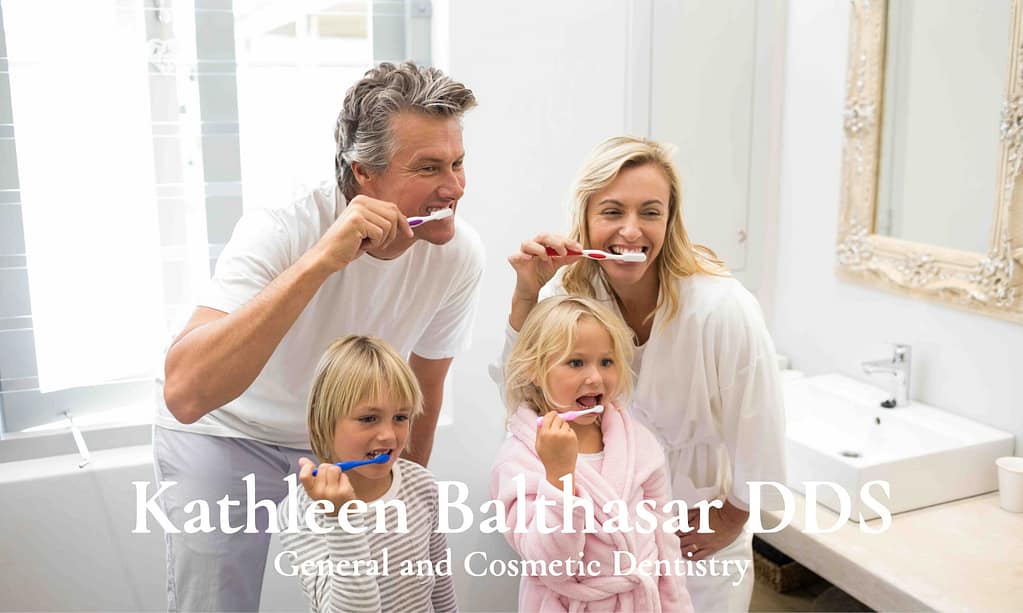How to Maintain Good Oral Hygiene at Home: Our Top 5 Tips and Tricks

Enjoy great oral health by maintaining oral hygiene.
Maintaining adequate oral hygiene with the right practices at home is key to ensuring you keep a strong, healthy smile that can stand the test of time. You can implement the following tips into your daily routine to ensure that you’re doing everything you can to enjoy a lifetime of great oral health.
1. Brush twice a day.
Brushing is an integral part of any effective oral hygiene routine. However, not everyone brushes quite like they should.
First, brushing once a day just isn’t enough. You should always strive to brush twice each day. Plaque and food particles that lead to tooth decay and gum disease build up on a continual basis, so giving them a full 24 hours to run rampant won’t do your oral health any good.
Additionally, you should also aim to brush your teeth for at least two minutes each time. Brushing faster or harder won’t help, and it could, in fact, damage your teeth. Brushing for a full two minutes can be particularly troublesome, namely if you’re helping your children brush. The good news is you can find toothbrushes that play a two-minute song to help time the process.
Lastly, you’ll want to make sure that you’re using fluoride toothpaste, as the mineral can make a huge difference when applied during every brushing. It remineralizes enamel to prevent tooth decay and cavities. Stick with a soft-bristled brush as well to prevent excess wear on your enamel.
2. Floss daily.
Flossing is often the first aspect of oral hygiene that people overlook, much to their detriment. It’s a vital process that removes plaque and food particles from between teeth. They are just as likely to cause cavities and gum disease between teeth as on the surface of your teeth, so you can’t overlook these areas. Flossing at least once a day is essential.
You also want to ensure that you’re using the proper technique. Use gentle movements to avoid damaging your gums. Get between all of your teeth, and use a long enough piece of floss so that you can use a fresh piece every time you move to the next tooth.
If flossing is too difficult, there are alternatives. Floss picks and interdental brushes can each improve maneuverability. You might also consider a water flosser, which blasts plaque with pressurized water that reaches every nook and cranny.
3. Use mouthwash.
Mouthwash can be an excellent addition to your oral hygiene routine. Both tooth decay and gum disease are caused by bacteria in your mouth. Mouthwash works to wipe out a lot of those bacteria, limiting their numbers and protecting your smile. It also provides a fresh scent for your breath.
However, you must keep in mind that mouthwash is not a replacement for brushing and flossing. It may combat bacteria, but it can’t remove plaque or bits of food stuck to tooth surfaces.
Therefore, it’s ideal to implement mouthwash into your oral hygiene routine once a day after brushing and flossing for an optimal clean. Choose a mouthwash with fluoride for maximum enamel protection.
4. Limit sugary foods and drinks.
Of course, what you eat also has a major impact on your smile. Sugary foods and drinks provide easy access to energy for bacteria. And as they metabolize the sugars, they secrete acid that weakens your enamel. Frequent consumption of sugary foods and drinks can greatly accelerate tooth decay. Many drinks, such as coffee and soda, are also acidic themselves, further compounding the risk.
As far as drinks go, simply sticking to water is the best choice. Avoid sparkling water, as even sugar-free flavors are acidic. Crunchy vegetables are just about the best go-to snack for your teeth, as they’re full of water and fiber content, which actually helps clean other debris from your teeth.
5. Schedule regular dental check-ups.
Patients of all ages should schedule regular dental checkups every six months; these visits are vital to safeguarding your smile. First, your dentist will carry out an examination to identify potential issues. Spotting them early allows for more effective and less invasive treatment options.
Following that, they will then carry out a professional dental cleaning. They’ll use special tools to deal with hardened tartar that is too tough for at-home brushing and reach plaque in nooks and crannies that brushing and flossing can’t. Altogether, a professional cleaning should supplement the routine you perform every day to provide lasting oral health.
Find out more from your affordable dentist in Williamsville.
You can implement the first four tips above to improve your oral hygiene at home. However, always remember that regular dental check-ups with your Williamsville family dentist are key to ensuring long-term oral health as well. Schedule your next appointment with Kathleen Balthasar, DDS today.